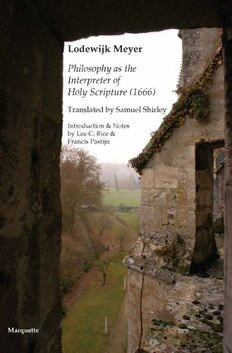
Philosophy as the Interpreter of Holy Scripture (1666) PDF
302 Pages·2005·5.116 MB·English
Most books are stored in the elastic cloud where traffic is expensive. For this reason, we have a limit on daily download.
Preview Philosophy as the Interpreter of Holy Scripture (1666)
Description:
Lodewijk Meyer (1629-1681) achieved fame in his own time as the author of the first dictionary of the Dutch language, the director of the Amsterdam Theatre, and one of the co-founders of the literary society, Nil Volentibus arduum. A personal friend of Baruch Spinoza, Meyer was the editor of the latter's Principles of Cartesian Philosophy (for which he also provided an extensive introduction) and one of those who arranged for the publication of the philosopher's works following his death in 1677. The first edition of Philosophy as the Interpreter of Holy Scripture was published anonymously in Amsterdam in 1666, and created an immediate furor and series of condemnations by the ecclesiastical courts. The work was also reprinted twice as an appendix to Spinoza's Theologico-Political Treatise; and in those editions was attributed to Spinoza. An anonymous Dutch edition appeared in 1667, and new Latin editions in 1673 and 1674. Evidence for the staying power of the work and the controversies which surrounded it is found in the fact that it underwent a fourth edition long after Meyer's death in 1776. The present translation is the first into English, and utilises the Latin editions of 1666 and 1673. Notes and variant readings to the Dutch edition of 1667 are also provided by Francis Pastijn (Marquette University). Samuel Shirley is also the translator of the complete Latin works of Spinoza (Hackett Publishing Company), a series for which Lee Rice (Marquette University) also served as co-editor. Because of the relation between Meyer and Spinoza, and the particular relation which Meyer's study of Scripture bears to Spinoza's own Theologico-Political Treatise; Philosophy as the Interpreter ofHoly Scripture' is an invaluable resource for the development of post-cartesian philosophy and its impact upon both theological and political debates at the end of the seventeenth century.
See more
The list of books you might like
Most books are stored in the elastic cloud where traffic is expensive. For this reason, we have a limit on daily download.
